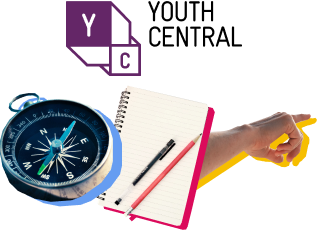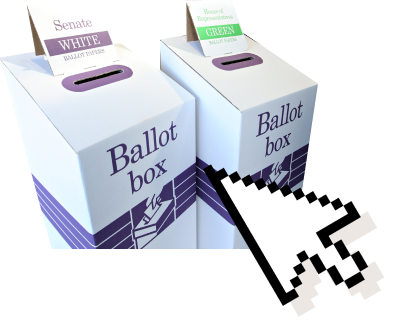If you’re 18 or older, you have to vote – it’s the law in Australia.
But you’re not automatically signed up to vote. You must register (‘enrol’) first to have your say on election day.
You can enrol either through the Victorian Electoral Commission (VEC), who manage state elections in Victoria, or the Australian Electoral Commission (AEC), who manage federal elections in Australia.
We are really lucky to live in a country that cares about what we think, want and need.
17 million+
Australians are currently enrolled to vote!
Why it’s important to vote
People in government make decisions that affect you. But none of them are young like you.
Having your say about who makes those decisions, and what decisions they make, is especially important for young people in Australia (and in Victoria).
It can impact things that you really care about and your rights as a young person.
It’s important to do your best to have your voice heard.
What is democracy?
A democracy is a system where the population, or all the eligible members of a population, vote to elect representatives to form a government.
We are the future! Our voices and needs need to be met and heard!
You can enrol to vote when you are 16 or 17 but you become eligible to vote once you turn 18.
How to register (enrol)
Enrolling to vote is really quick and easy.
You need to enrol through the Victorian Electoral Commission (VEC), who manage state elections in Victoria, or the Australian Electoral Commission (AEC), who manage federal elections in Australia.
You will receive a confirmation from the AEC, then follow the instructions to register your details online. It will say that your enrolment has been accepted and you are on the electoral roll.
If you know there is an election coming up, make sure you are enrolled and all your details are up to date. Do this well before the election date to avoid a fine!
Enrolling through the Australian Election Commission will enable you to vote in federal, state and local government elections and referendums.
When do you need to vote?
Voting happens more than you think!
You must vote in:
- federal elections (Australia’s Prime Minister)
- state elections (the Victorian Premier)
- local council elections (the local mayor)
Local elections
Local council members make decisions about important things in your community such as parks, sporting facilities and community centres.
The people who form the Council are called councillors and the head of the Council is the Mayor.
Voting in council elections in Victoria is not compulsory unless you live in Melbourne City Council. You can learn more about council elections on the Victorian Electoral Commission website.
Remember to update your details with the AEC if anything changes – particularly your address.
State elections
In a state government election, you get to vote for who will be in charge of making decisions about bigger things in your community, such as hospitals, crime prevention, and transport.
State elections in Victoria are held every four years. You will often know one is happening when you get information in your mailbox or see signs up around your neighbourhood asking you to vote.
You can learn more about state elections on the Victorian Electoral Commission website.
Federal elections
In federal elections, Australians vote to choose Members of Parliament who will best represent their views and interests in the Senate and House of Representatives.
A federal election is held once every three years and the exact date will be announced by the government at some point during the third year.
You can learn more about federal elections on the Australian Electoral Commission website.
I was excited to enrol but a bit overwhelmed about how to inform my vote.
Avoiding a fine
Once you are on the electoral roll, it is a legal requirement that you vote. The government may fine you if you don’t.
The government is quite flexible though. Something might happen to you on the day, and you simply can't make it to a polling booth.
This is ok! You just need to let them know and you will avoid a fine. You can contact the AEC (if it’s a federal election) or the VEC (if it’s a state or local government election), explain the situation, and provide any supporting evidence.
I first voted when I was travelling overseas. The Australian embassy was super useful.
If you’re over 18 and not enrolled
The government will know you haven’t registered. So you may still receive a fine.
If you need to do something important on election day (like moving house, or you’re travelling) you can vote early (in the weeks leading up to the election).
The AEC and VEC will list on their website all the pre-election polling booths so you can choose one close to where you live. You may also be eligible to vote by mail.
Remember it’s your decision
Who you decide to vote for is your decision alone.
Just because your family or friends vote for a particular individual or political party doesn't necessarily mean that is who you might want to vote for too.
It’s really important to make your own decision.
There are some great online tools such as Vote Compass that can help you find out more about each party, and politician, their policies and how they align with your own values.
Remember:
- Don’t forget to vote
- Always keep your details updated
- Take some time to make your decision on who you want to vote for
- When you start seeing political posters everywhere, you know an election is coming
- Avoid a fine. Let the AEC know if you cannot vote on election day.

Ready to put your skills into practice?
Get comprehensive guidance on voting and elections at Youth Central.







